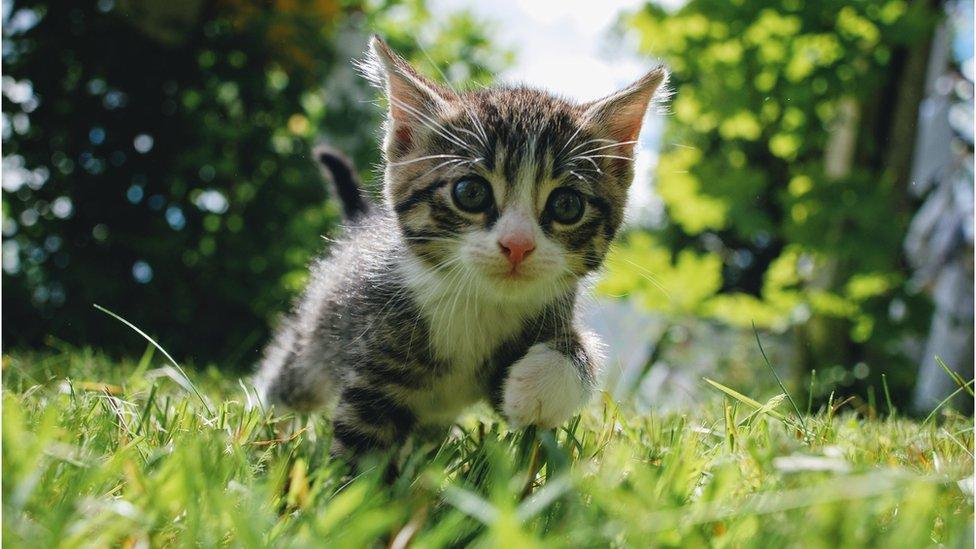Why are there calls for all cats to be microchipped by law?
- Published
- comments

We all love our furry friends, so losing a pet can be tough.
One thing which animal charities and pet owners think can help if a cat gets lost, injured or stolen, is if it has a microchip.
The government is considering making it compulsory for all owners to get their cats microchipped when they get them. That means it would be against the law if they don't.
A microchip is a small device, about the size of a grain of rice, that is implanted into the pet typically between their shoulder blades. The procedure is usually painless for the animal.
When a lost pet is found, the microchip can be scanned and it will bring up the owner's details from a database.
The vet or agency who have the lost pet will then be able to contact the owners and organise for it to be returned or collected.
This cat is having a microchip implanted
It is already the law for all dogs to have one and has been since April 2016 - around nine million dogs have been microchipped.
It is estimated that over a quarter of pet cats in the UK aren't microchipped. If the new law is brought in, it's thought 2.6 million cats, and their owners, would benefit.
Vets, animal charities such as Cats Protection and rescue centres including Battersea Dogs and Cats Home, support the idea.
Cats Protection, as the leading cat charity, has campaigned for many years for microchipping to be made compulsory for owned cats, giving them the same protection as dogs if they get lost. Cats are a much loved part of the family in millions of homes, and it is heart-breaking if they go missing without a trace.
But while lots of people are in favour, some owners might be hesitant in case something goes wrong, for example if their cat gets an infection.
The microchips are also only really useful if the details on them are kept up to date, so for example if a pet is sold or its owner changes, the information would need updating.
We would always recommend that owners not only get their cat microchipped but also ensure their contact details are kept up to date, so that if their pet does go missing, local authorities and rescues like Battersea can quickly reunite them.
The government is currently asking the public for their thoughts on making it a legal requirement for all cat owners to get their cats microchipped.
It launched an eight-week consultation in December and the law could come in as soon as this year.
Previous consultations by the government showed 99% support for microchipping.
It is hugely important that cats and kittens are microchipped as this is often the only hope owners have of seeing their lost cat returned safely to their home.
Daniel and Casper's story
Watch Daniel and Casper's story and see how a microchip works
Daniel is also supporting the idea after his cat Casper went missing in 2017. They were reunited three years later though because of Casper's microchip.
Daniel says he was "so excited" when Casper was returned that the first thing he did was "pick him up and give him cuddles".
He added: "If it wasn't for the microchip, I wouldn't have my cat back."
He now thinks all cats should be microchipped by law, especially as it's already in place for dogs.
- Published24 January 2021
- Published19 January 2021
- Published18 October 2020
